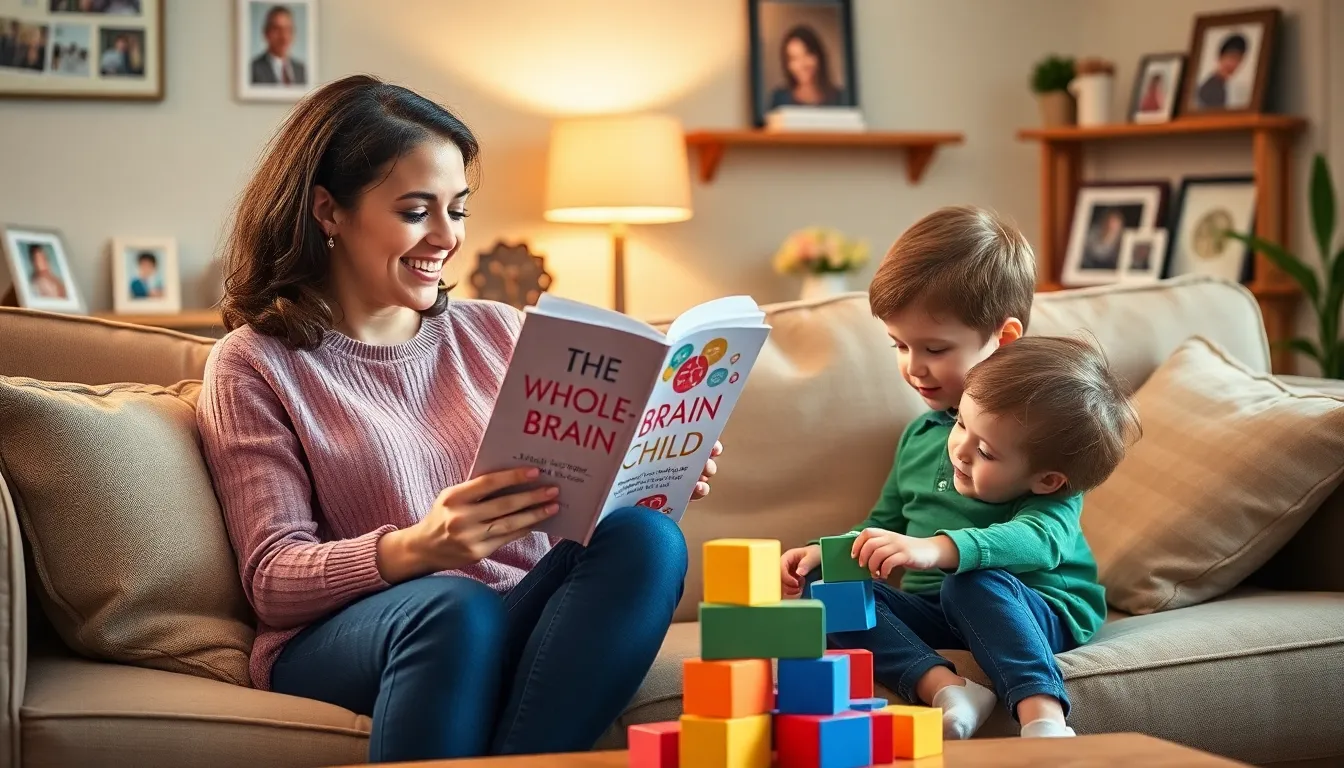Navigating the wild world of parenting can feel like trying to assemble IKEA furniture without the instructions. Enter authoritative parenting books—your trusty manuals in this chaotic journey. These gems offer a balanced approach, blending warmth with structure, ensuring kids grow up confident and responsible.
Table of Contents
ToggleOverview of Authoritative Parenting
Authoritative parenting represents a balanced approach that emphasizes both discipline and emotional support. This style encourages open communication while maintaining clear expectations. Research consistently shows that children raised with authoritative parenting techniques tend to exhibit higher self-esteem and better social skills.
Examples of authoritative parenting include setting consistent rules coupled with warmth and guidance. Parents who practice this style actively listen to their children’s thoughts and feelings. Such engagement fosters strong parent-child relationships, promoting trust and mutual respect.
Theoretical foundations of authoritative parenting derive from the work of developmental psychologist Diana Baumrind. Baumrind’s studies indicate that authoritative parents establish high standards while remaining responsive to their children’s needs. This balance helps children develop autonomy alongside responsibility.
Studies from sources like the American Psychological Association confirm that authoritative parenting correlates with positive developmental outcomes. Children often display better academic performance, resilience, and emotional regulation. These outcomes result from supportive environments where boundaries coexist with encouragement.
Books focusing on authoritative parenting provide invaluable insights and strategies. Titles such as “The Whole-Brain Child” by Daniel J. Siegel and Tina Payne Bryson illustrate techniques geared toward fostering healthy child development. Meanwhile, “Parenting with Love and Logic” by Charles Fay and Foster Cline offers a unique perspective on teaching responsibility through natural consequences.
Many parents embrace authoritative parenting principles to navigate the complexities of raising children. This informed approach helps create environments conducive to children’s growth and well-being.
Benefits of Authoritative Parenting Books

Authoritative parenting books serve as vital tools for parents aiming to cultivate healthy relationships with their children. These resources offer practical strategies rooted in solid research.
Enhancing Parenting Skills
Enhancing parenting skills becomes easier with authoritative parenting books. They provide actionable techniques for effective communication. Parents learn to establish consistent routines that encourage responsibility. Each technique fosters a supportive parenting environment. Resources often include real-life examples that clarify complex concepts. Books like “The Whole-Brain Child” highlight various scenarios illustrating skill application. Readers experience improved confidence as they implement learned strategies. These books empower parents to handle challenges more effectively, promoting positive interactions.
Understanding Child Development
Understanding child development gains clarity through authoritative parenting literature. Theoretical insights into stages of growth enhance awareness of children’s needs. Parents discover how emotional support impacts behavioral outcomes. Research indicates that children thrive in structured environments. Books detail the importance of cognitive and emotional development, making concepts approachable. Readers identify developmental milestones, allowing for timely interventions. Knowledge gained from these resources enables parents to nurture autonomy and resilience in their children, ensuring well-rounded growth.
Top Authoritative Parenting Books
Several authoritative parenting books offer valuable insights and strategies for effective parenting. Each title addresses key elements such as communication, discipline, and emotional support.
Book 1: “The Whole-Brain Child” by Daniel J. Siegel and Tina Payne Bryson
“The Whole-Brain Child” blends neuroscience with parenting techniques. This book explains how understanding a child’s brain development fosters positive behavior. It presents twelve key strategies that promote emotional intelligence and resilience. Parents discover how to integrate these insights into everyday interactions. They learn to address children’s emotional needs while setting appropriate boundaries. Each chapter features practical examples, making concepts accessible and applicable.
Book 2: “Parenting with Love and Logic” by Charles Fay and Foster Cline
“Parenting with Love and Logic” emphasizes the importance of allowing children to experience the consequences of their choices. Fay and Cline advocate for a mix of empathy and accountability. They guide parents to use love and logical consequences when disciplining. Parents gain frameworks for fostering decision-making skills in their children. This approach strengthens responsibility and promotes self-discipline. Each section includes real-life scenarios that illustrate how to implement these principles effectively.
Book 3: “How to Talk So Kids Will Listen & Listen So Kids Will Talk” by Adele Faber and Elaine Mazlish
“How to Talk So Kids Will Listen & Listen So Kids Will Talk” focuses on communication techniques that resonate with children. Faber and Mazlish offer practical tools for improving parent-child dialogue. Key strategies in the book center on validating emotions and encouraging cooperation. Parents learn to express their feelings without dismissing their child’s needs. Illustrative cartoons and examples enhance understanding and engagement. This resource empowers parents to build stronger, more meaningful connections with their children.
How to Choose the Right Book
Choosing the right authoritative parenting book can significantly impact parenting effectiveness. Parents should consider specific aspects to ensure they select a book that aligns with their needs and values.
Consider Your Parenting Style
Assessing one’s parenting style is essential. Understanding whether a parent leans toward authoritative, permissive, or authoritarian influences book selection. Parents often benefit from choosing resources that reinforce their parenting approach while offering fresh insights. Identifying personal values regarding discipline and emotional support shapes decisions too. Parenting styles determine strategies parents might resonate with. High expectations combined with warmth often reflect authoritative parenting, making corresponding books more relevant for those parents. Selecting resources that align with these principles fosters effective interactions and nurtures children’s growth.
Look for Credible Authors
Searching for credible authors enhances book selection. Authors with expertise in child psychology or years of experience in parenting bring valuable perspectives. Notably, experts like Daniel J. Siegel and Tina Payne Bryson have proven their knowledge through extensive research. Reading reviews and endorsements helps gauge an author’s reliability. A good reputation in the field often equates to trustworthy advice. Parents should look for authors whose work is widely cited and acknowledged within academic circles. Credible authors provide evidence-based strategies, ensuring parents receive sound guidance on nurturing their children’s well-being.
Authoritative parenting books serve as essential guides for parents navigating the complexities of child-rearing. By blending warmth with structure these resources empower parents to foster healthy relationships and promote their children’s development. With practical strategies and evidence-based insights they equip parents to communicate effectively and set clear expectations.
Selecting the right book can significantly impact parenting success. By aligning choices with personal values and understanding child development stages parents can enhance their skills and nurture resilience in their children. Embracing the principles of authoritative parenting not only supports children’s growth but also strengthens family bonds, creating a nurturing environment where children can thrive.








